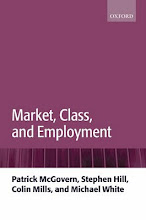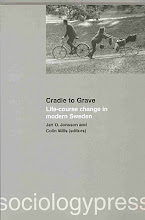I mentioned in an earlier post that the first sociology book I ever read was Richard Hoggart's The Uses of Literacy. The second was almost certainly Robert Roberts' The Classic Slum an account of working class life in Salford in the first quarter of the Twentieth Century. Of the two, I much preferred Roberts' lack of sentimentality and I was reminded of the excellence of his prose on reading his autobiography A Ragged Schooling.
He is particularly good on the status distinctions that patterned working class social life. From the outside the poor may have looked like a mass, but things looked very different from the inside. Many of the distinctions he alludes to were still lived realities when I was growing up more than 50 years later amongst Coventry's affluent workers. The primary distinction was still clearly between the rough and the respectable. This applied both to individuals and also to streets. By the age of eight or nine I had a good sense of the social geography of our area and what occupancy of different types of housing stock signified. Our street was divided in two by a more major road; the terraced houses on our half had neatly lawned front gardens (now I see from Google Street View mostly tarmacked over to accommodate cars). The other half had much smaller front gardens or had front doors that opened directly on to the street. Respectable people had proper front gardens.
Moving just a few streets further away and closer to the football stadium there were some very rough streets where kids would throw stones at you if you looked 'posh': 'posh' was a very relative thing. Rough people had too many kids, kids that roamed the streets til all hours, were unemployed or irregular workers, drank too much, got into debt, cursed and swore, beat their wives and generally made a nuisance of themselves. The respectable tended their gardens, cleaned their windows, limited the size of their families and wanting the best for their kids, went, albeit hesitant and deferential, to school open days.
After the rough/respectable division probably the next most prominent distinction was between those with and those without a trade. Time served craftsmen and those with a skill in some sense ranked higher than the unskilled or those whose skill - like driving an HGV - was not acquired through apprenticeship. Or at least that is how it felt, but I'm not sure that patterns of social interaction would necessarily reveal it.
Thinking of my parent's friends - those whom we exchanged visits with - the skilled/unskilled divide seems pretty unimportant. In one family the husband was a carpenter working in the building trade in another he worked on the line at one of the car factories just as some of our own relatives did. As my father ascended into the lower reaches of the middle classes our social network expanded but only a little, primarily sucking in people from the local church, a shopkeeper, a lab technician from Courtalds, the minister himself.
If I think about my own school friends I'm struck in retrospect by how little status distinctions, other than that of roughness/respectability, mattered in practice. My friends' fathers - and yes, as long as they were alive, it was the fathers that mattered - worked in a mixture of skilled and unskilled trades. Some worked on the line in the car factories, at GEC, Massey Ferguson and Rolls-Royce. Others had small businesses - a chip shop, a Hoover servicing franchise operated from a shed at the bottom of the garden. A couple had only widowed mothers to bring them up, one a lollipop lady the other delivering letters for the Royal Mail. What, if anything, connected us together was selection into the "grammar school" streams of the local comprehensives we all attended. The few kids in our area whose parents paid for them to go at 11 to one or other of the city's two main independent schools disappeared from our friendship network as surely as if they had been abducted by aliens. And in a number of cases the end result was such that they might as well have been.
What is most striking is the almost complete absence of the professional classes from our social world. The woodwork teacher from my school lived on our street, just a few houses down on the other side of the road, but other than a ritual exchange of pleasantries my parents had nothing to say to him. A few professional representatives of the state - the odd teacher, more rarely a doctor, lived, Ken Barlow like, amongst us. But they were not really part of our lives except when they were schooling or curing us.
It's not that there was any antipathy towards educated professional people, it was just that they made people like my parents feel uncomfortable. We didn't fit into their world, didn't know what to say, they had different tastes and conventions: they led different, often peculiar, lives. A local couple we knew as acquaintances through the church - both delightfully unsnobbish teachers - exemplified the eccentric otherness of this world: the husband complete with apron did all the cooking in the household. What more proof was needed of the strange ways in which the professional classes carried on!
Thinking back what impresses me most is how such distinctions of status as we made can only be understood as applying at a local level. The outside world saw a mass where the insiders perceived gradations. To some extent these gradations were correlated with money. The rough were poor by anybody's standards (but not all the poor were rough) and the respectable, though not necessarily affluent, by definition had steady incomes from which they saved to pay off respectable debts - like their mortgages. Status lay behind patterns of derogation, association and commensality in the adult world - less so in the child's world - but it was status in the local community that created the living texture of our day-to-day world. Weber in Economy and Society makes a few tantalizing remarks along these lines:
...in the so-called pure democracy, that is, one devoid of any expressly ordered status privileges for individuals, it may be that only the families coming under approximately the same tax class dance with one another. This example is reported of certain smaller Swiss cities. But status honor need not necessarily be linked with a class situation. On the contrary, it normally stands in sharp opposition to the pretensions of sheer property.
Status has a now you see it, now you don't quality. It's part of the taken for granted, part of the fine grain of social relations in your local social world.










No comments:
Post a Comment